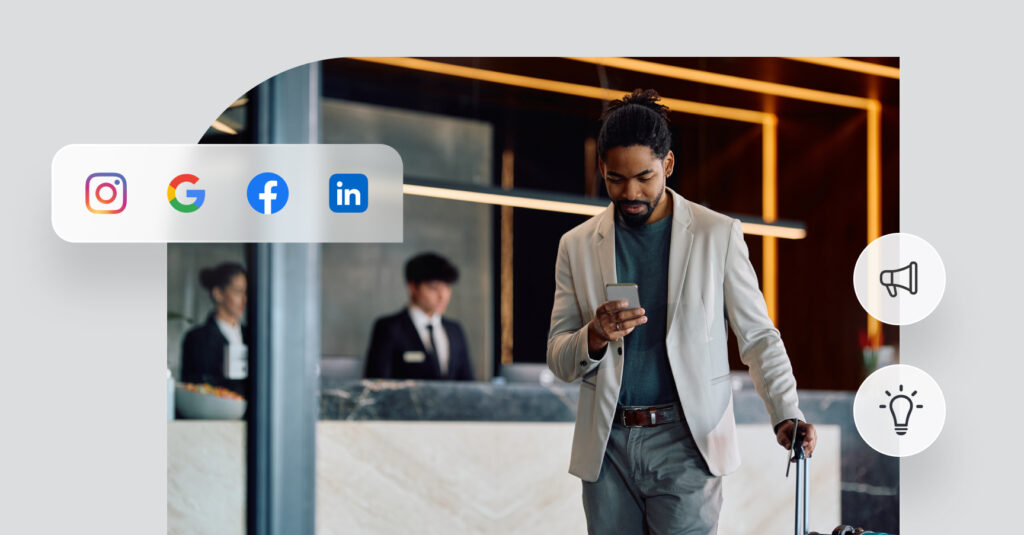Introduction
In today’s digitally driven travel landscape, the success of a hotel is no longer dependent on just location, facilities, or star ratings. It is deeply tied to how well it connects with its audience online, particularly through social media platforms. Social media has evolved from being a casual networking space to one of the most powerful tools in hospitality marketing. For hotels, both boutique and luxury chains, a strong social media marketing strategy can mean the difference between empty rooms and fully booked seasons. Travelers now research, compare, and book hotels through their mobile devices, and social media platforms like Instagram, Facebook, and TikTok serve as windows into what staying at your property truly feels like. Creating an effective social media marketing strategy for hotels in 2025 involves a blend of storytelling, engagement, branding, user-generated content, influencer partnerships, data-driven campaigns, and real-time responsiveness. In this comprehensive guide, we delve into the essential pillars of social media marketing strategy for hotels and how hoteliers can build visibility, trust, and bookings through carefully crafted digital presence.
Understanding The Role Of Social Media In The Hotel Industry

Social media plays a transformative role in how hotels attract and retain guests. Platforms like Instagram are visual showcases, where travelers seek inspiration for their next vacation or business trip. Facebook provides a community-like environment to interact with potential and returning guests, while Twitter allows quick updates, service messages, and responses. TikTok has rapidly emerged as a powerful channel for reaching younger travelers through short-form videos, creative content, and trends. LinkedIn, though more corporate, is valuable for promoting hotel brands, corporate packages, or conference facilities. Through each of these platforms, hotels can engage directly with audiences, humanize their brand, promote offers, handle customer service queries, and build lasting connections. Social media also bridges the gap between marketing and customer experience by acting as both a promotional tool and a feedback channel. A guest posting about their positive stay on Instagram can bring in dozens of new bookings if the hotel capitalizes on that moment. The impact of social media is no longer optional; it is central to a hotel’s branding and marketing function.
Building A Strong Brand Identity Online
For a hotel to stand out in a competitive marketplace, it must have a distinct brand identity that resonates across all social platforms. This involves defining the hotel’s unique personality, voice, visual aesthetics, and core values. Is the hotel known for luxury and elegance, or is it positioned as a cozy, eco-friendly retreat? Does it attract digital nomads, romantic couples, or business travelers? A clear understanding of target audience demographics and psychographics is essential. Once this identity is established, it should be consistently reflected in the tone of captions, choice of imagery, color palettes, and even hashtag strategies. The use of branded hashtags or location tags can reinforce the brand’s presence and make it easier for users to discover relevant content. Every post, story, reel, or tweet should feel like it belongs to the same cohesive narrative. In a medium dominated by visuals, especially on Instagram and TikTok, professional photography, drone footage, and storytelling videos play a massive role in capturing attention. When a hotel maintains a well-defined and visually appealing social media brand, it fosters trust and recognition among travelers.
Developing A Content Strategy That Converts
An effective social media strategy for hotels is built on high-quality, diverse content that educates, entertains, and inspires potential guests. Hotels need to go beyond simply posting offers or images of rooms. The content should reflect the guest experience in its entirety. This can include behind-the-scenes glimpses of the kitchen, staff spotlights, local travel tips, spa or amenity walkthroughs, guest testimonials, seasonal celebrations, and destination highlights. A balanced mix of promotional, informative, and user-focused content helps keep the audience engaged without overwhelming them with constant ads. Stories and reels are particularly effective for showcasing quick moments like sunrise views from the balcony, a chef preparing a signature dish, or a guest’s real-time reaction to a surprise room upgrade. Videos generally outperform photos in reach and engagement, and hotels that leverage short-form video consistently tend to see better traction. Planning content calendars in advance, aligning posts with festivals, local events, or global travel trends, and using data insights to improve content types ensures ongoing relevance and performance.
Leveraging User-Generated Content And Guest Stories
One of the most effective and authentic forms of content comes directly from hotel guests themselves. User-generated content (UGC), such as guest photos, videos, or reviews shared on social media, carries immense credibility and relatability. When travelers see real people enjoying a stay at your hotel, it builds trust faster than professional ads can. Encouraging guests to tag the hotel’s social profiles, use branded hashtags, or share their experiences in stories can create a wealth of shareable content. Hotels should actively repost or re-share high-quality guest content, giving credit while showcasing genuine moments. Creating social media walls in lobbies or offering incentives such as discounts for tagged posts can boost guest participation. UGC not only enhances the hotel’s content pipeline but also transforms satisfied guests into informal brand ambassadors. With proper permissions, this content can even be repurposed for ads, email newsletters, or the hotel website. Celebrating guest experiences on social platforms creates a sense of community, showing future visitors the warmth and connection they can expect during their stay.
Influencer Marketing For Hotel Growth
Partnering with influencers has become a cornerstone of successful hotel social media marketing strategies. Influencers bring a pre-established audience, credibility, and creative flair to hotel promotions. Micro-influencers with engaged local or niche travel followers often perform better than celebrities, as their recommendations feel more genuine and accessible. Hotels can collaborate with influencers to create vlogs, travel diaries, Instagram takeovers, or story series that show the experience from a traveler’s point of view. It’s important to vet influencers based on relevance, audience demographics, content quality, and engagement rates rather than just follower count. When done right, influencer partnerships can result in massive brand exposure, increased bookings, and enhanced reputation. Seasonal influencer campaigns, especially during holidays, long weekends, or launch of new services, can significantly boost a hotel’s visibility. Tracking ROI through booking codes, affiliate links, or tagged engagement also helps evaluate the effectiveness of influencer collaborations.
Using Paid Social Media Ads To Drive Bookings

Organic reach on social media is increasingly limited due to platform algorithms, which is why paid social media ads are essential for hotels aiming to reach wider audiences. Facebook and Instagram Ads allow precise targeting based on user interests, travel intent, demographics, and behavior, enabling hotels to showcase their properties to highly relevant users. Retargeting campaigns are especially powerful, letting you reach people who visited your booking site but didn’t complete the reservation. Carousel ads can highlight multiple rooms or packages, while video ads can tell a story in under 30 seconds. Special offers, seasonal packages, event promos, and early bird discounts make for effective ad content. It’s important to design landing pages that align with the ad creatives, creating a seamless conversion experience. A/B testing, analytics tracking, and consistent budget optimization are necessary to ensure ad campaigns deliver strong ROI. In 2025, paid social media advertising is no longer a luxury for hotel marketing—it’s a fundamental part of the digital mix.
Engaging With Audiences And Managing Online Reputation
Social media isn’t just a broadcast tool; it’s a two-way conversation. Hotels must actively engage with their followers by responding to comments, answering queries, acknowledging feedback, and joining conversations around travel trends or destination hashtags. Timely and friendly responses build brand trust and demonstrate good customer service. It’s equally important to handle negative reviews or complaints gracefully and publicly when appropriate. A polite, helpful reply to a complaint can do more for your brand image than a dozen promotional posts. Community engagement also includes celebrating user milestones, reposting guest stories, and even starting branded challenges or contests. Being responsive and present creates a positive online reputation that influences how potential guests perceive the hotel. Tools like social listening software can help hotels monitor mentions across platforms, track sentiment, and identify trending topics to jump into. A hotel that is socially active and reputation-aware is far more likely to attract loyal customers and repeat business.
Creating Localized And Culturally Relevant Content
Travel is a local experience, and the content a hotel posts should reflect this reality. Localizing your social media strategy by showcasing local attractions, cuisine, traditions, festivals, and landmarks creates a stronger connection with potential guests. If your hotel is in Jaipur, for example, highlighting Holi celebrations or traditional Rajasthani meals gives travelers a glimpse into the regional culture. Posting in multiple languages or dialects can also widen your appeal to diverse audiences, especially international travelers. Collaborating with local businesses, such as tour guides, spas, or cultural centers, can enrich your content while building community relationships. Tagging local accounts, using geo-specific hashtags, and participating in city-level campaigns helps improve discoverability. In 2025, authenticity and locality are key social media drivers, and hotels that represent their surroundings with pride and creativity gain more attention and loyalty from travelers seeking immersive experiences.
Embracing New Platforms And Trends
Social media trends evolve rapidly, and hotels must adapt to remain relevant. TikTok, with its massive user base and viral nature, has become essential for hotel marketing, especially among Gen Z and millennial travelers. Short, authentic videos showing room tours, staff moments, or “day in the life” stories can go viral and generate thousands of views. Similarly, platforms like Threads or future AI-integrated social media apps may shape how hotels connect with tech-savvy travelers. Staying updated with features like Instagram Guides, Pinterest Story Pins, YouTube Shorts, or even AR filters lets hotels be seen as modern and innovative. Adopting trends early, like using trending audio or memes, increases visibility. However, it’s crucial to stay authentic to your brand voice while riding these waves. The most successful hotels use a blend of timeless storytelling and trend-aware execution, ensuring they appeal to both traditional travelers and digital natives.
Analyzing Metrics And Optimizing Strategy
The success of a social media marketing strategy cannot be judged by likes or follower counts alone. Real performance comes from meaningful metrics such as engagement rate, website clicks, conversion rates, cost-per-booking from ads, and overall ROI. Social media platforms offer detailed analytics dashboards, and tools like Google Analytics, Meta Business Suite, and third-party software help track deeper insights. Hotels should regularly assess which types of posts drive the most engagement, what times and days see the most activity, and which campaigns lead to actual bookings. Monthly performance reports can inform future strategy, highlight weak spots, and celebrate high-performing content. Split testing of captions, visuals, and call-to-actions can refine what resonates best with the audience. Data-backed decisions allow hotels to allocate resources smartly, avoid content fatigue, and achieve consistent growth through digital channels. A winning strategy is one that evolves with performance feedback, audience behavior, and industry trends.
Training Staff And Aligning Social With On-Site Experience

A great social media strategy is incomplete if it’s disconnected from the actual guest experience. Hotels must train staff to understand the value of social media and encourage them to participate positively. From receptionists to housekeeping, every team member should be aware that guests may share their interactions online. Consistency between online promises and on-site delivery ensures happy guests and glowing reviews. Some hotels even appoint “social media ambassadors” among staff to share stories, answer questions, or guide guests toward photo-worthy moments. Encouraging staff to join in fun trends or challenges adds a human touch and builds stronger guest-staff relationships. Internal alignment between digital marketing and customer service guarantees that the hotel’s brand is not only seen but felt across every touchpoint.
Conclusion
A powerful social media marketing strategy for hotels in 2025 goes far beyond pretty pictures and hashtags. It’s a dynamic, multi-layered approach that blends content creation, influencer partnerships, community engagement, ad targeting, analytics, and brand storytelling. As guests become more digitally fluent and expect real-time, transparent communication, hotels must elevate their social media presence to meet—and exceed—those expectations. Whether you run a boutique retreat or a multinational hotel chain, the key lies in authenticity, consistency, and responsiveness. By focusing on the human side of hospitality, leveraging trends without losing brand identity, and aligning digital efforts with on-the-ground service excellence, hotels can turn social media into a long-term engine of guest engagement and revenue growth.

